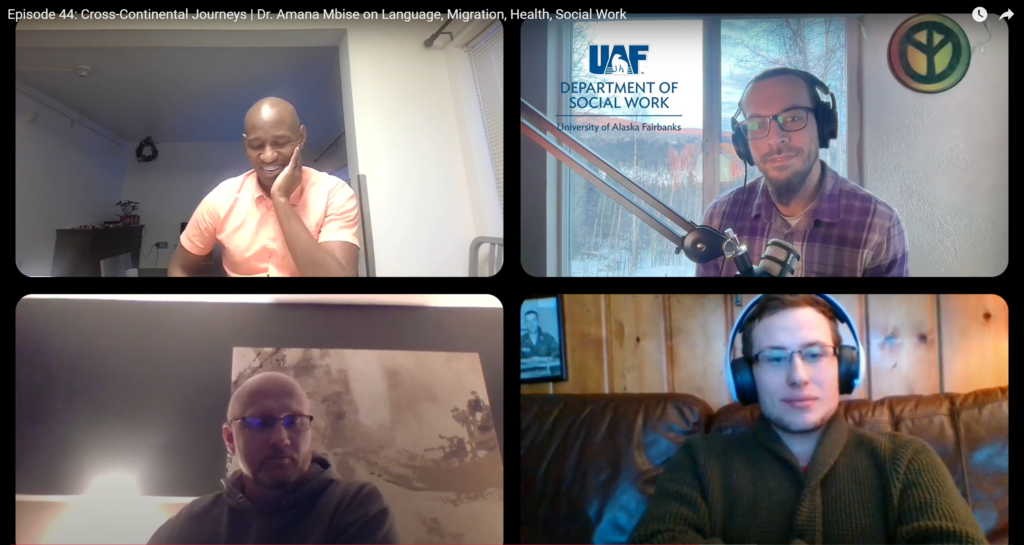The Critical Social worker can be heard live on Saturday mornings at 9am: https://riverside.fm/studio/aces-studio-T1Ehj Links to an external site.

Currently Dr. Mbise is a professor of Social Work at UAA, though his journey originally had him in the realm of sociology. His choice to move into social work stemmed from wanting to not only study the issues of humanity, but to help with the injustices and needs he observed.
Born in Tanzania, he belongs to a tribe called, “Vara”. There is little publicly known about the tribe as there are only about 125,000 member. The Government of Tanzania simply call them the Meru people, which turns out to be a combination of many peoples under a simplified umbrella. But who then, are the Meru? Even that descriptor meant little to me until I looked into it. The official answers
Dr. Mbise spent time in Denmark advocating for services to be provided to unaccompanied minors who were seeking asylum. There were many things about that experience that were frustrating to him, as he felt the bureaucracy should have acted sooner and more magnanimously towards the refugees.



My Take: I believe whole heartedly that indigenous and traditional languages should be preserved. However, I also believe that the motivations of one or two hundred years ago, are not the same, at least concerning languages. So, in the following, I will play the Devils advocate.

The issues surrounding the national language and “tribalism” can be complex. At first it may seem backward for Tanzania to have the official policy of “un-supporting” the individual tribal languages and promoting Swahili as the only official language of the nation. However, there is merit to this as the country is trying to prevent infighting amongst the various tribes, and as many pointed out, often, our language is a large part of who we are. Tanzania needs its members to be first and foremost, Tanzanian.
Having pride in self and one’s individual culture is important. It’s motivational to the individual and to the community. However, it is but the smallest step, having pride in one’s culture, to believing it is superior to another, and an even smaller step in believing the other culture is of less worth than your own. The smallest misstep can lead one from pride, to insult, then from insult to injury.
Many times, Dr. Mbise has correctly stated that Africa is known to be the largest collection of individual cultures on the planet. Unfortunately, along with that comes other things. One of those things is the prominent negative expectation that somewhere, probably several places, there is some form of genocide or ethnic cleansing going on at any given point. In fact, it happens so often that we in the west have become numb to it. This has in turn given opportunity to those who are perpetrating these acts to continue them with impunity. Anyone who has read excerpts surrounding the Rwandan Genocide, or watched the movie Blood Diamond, has heard the phrase, “TIA, nobody cares,” or more often, just “TIA”. For those who are uninitiated, it means, This is Africa. You can do what you want because, nobody cares. Well, Tanzania cares.
There is a quandary for certain, because while creating a cohesive community benefits all, the loss of individual identity is felt deeply and mourned in every culture it happens to. Ideally, there should be a way of preserving and integrating. Dr. Mbise states vehemently that it is assimilation, but I believe he is maligning the motive behind it. In fact, even he states the issue of not having a common language at 1:18:41, “…but there was also language issues. For me, it was also a language barrier. I had to speak Danish, ah, it’s a totally different context. To receive services, to be able to provide services, there was very little that I could do because there was so much I could not understand because of the language barrier that I had.”
This was of course in context of his aid work in Denmark. But let’s take this lesson and apply it to Tanzania. Assume there was no common language, how would one village do commerce with another. How would anything be produced but misunderstanding and chaos? Apply this to the U.S. Would there be the strides forward in health care, science, or even education if there were not a National language? Take this class, if there were no common languages expected, would this class or even this school be here today? Would we even care about the needs addressed by social work? I say we would not. We would be as insular as the one language we knew, caring only for our own.
It my a public communication class several years ago, there was a presentation we had to do on business from the perspective of other countries. One point, both unexpected and interesting I took away from that class was a change in perspective on why English is so prevalent. In an interview with a German based investment company, I was told that English fluency was a requirement. I asked why that was, and I believe I inferred that there was some level of cultural bullying that made English the official business language globally. To this, the woman laughed, and said, “You American’s will always find something new to hate, but you hate yourselves especially. It is arrogant to say that the United States or the United Kingdom has so much influence. No, the reason English is the official language of business around the world is because so little of it is English. It adopts anything it doesn’t already have, and it doesn’t apologize, it just uses the word and now it’s official.” I still disagree that the U.S. and U.K. didn’t and don’t hold vast amounts of sway when it comes to language, but her rebuttal presented an unexpected perspective.
She went on to say that even her own language of German had gaps that they would commonly use an English word to fill, because there were no Germanic ways of saying it. She stated that it the problem was worse in other parts of the globe, and that negotiating with a company who had no English speaking agents could be a nightmare as there was often little common ground to explain context and meaning in a business setting; even when someone from her firm knew the other language.
In the end, there is much attention given to the “get back to our roots” movements, and I myself am part of that, having bought courses to learn Irish Gaelic. But let us not forget that our roots were meant to grow something. Without a little assimilation, we are nothing tomorrow that we weren’t yesterday.
